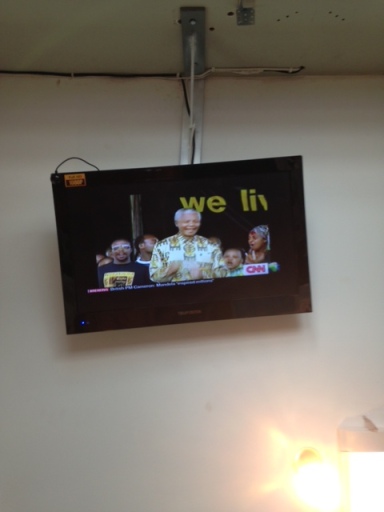I spent most of the day after Madiba died lying on my back watching tributes on CNN and Sky. That’s because I spent the entire day at the dentist, and he distracts his patients from the drilling by giving them TV to look at.
I arrived at 8.30am and his work, installing 11 crowns — I have weak enamel, and this was three years overdue — was done by 4pm. That’s a lot of pain. A lot of drilling. A lot of lying in a chair and watching the headlines scroll past. And at the end, paying over the rest I owed. I now have the equivalent of an entry-level car in each jaw.
This was my view:

In between the drilling sessions, when Dr Thandar gave me a break while his special German machine milled new crowns for me out of composite ceramic material, I sent emails to clients advising them on how to handle upcoming campaigns in the light of Madiba’s passing.
It was surreal.
The night before, I had tweeted fretfully about the fact that I had sold my Madiba tribute painting that day, one painted a few months ago, and how worried I was that this was some sort of inadvertent sign. The woman who bought it — she already owns one of my cows — now possesses something rather special.
And so, that morning, I awoke to the news. I felt relief more than anything: Madiba is finally free. When I last wrote about how I felt about him for Thought Leader, back in July, I explained why I would not feel sad about him. There is too much to celebrate.
What a great leader he was, far greater than most of the famous men he is now compared to. Over the past couple of months, client work has meant that I have been reading closely through Long Walk to Freedom, searching for my favourite passages.
This one, about gardening, is the one I like the most, and it was the inspiration for this lipstick stop-motion video I filmed with the help of two colleagues two weeks ago:
“A garden was one of the few things in prison that one could control. To plant a seed, watch it grow, to tend it and then harvest it, offered a simple but enduring satisfaction. The sense of being the custodian of this small patch of earth offered a small taste of freedom.
In some ways, I saw the garden as a metaphor for certain aspects of my life. A leader must also tend his garden; he, too, plants seeds, and then watches, cultivates, and harvests the result.”
We were planning to release it this week anyway, and it is strange how history caught up with us. I recorded the piano track on my father’s Otto Bach on Tuesday, and the final voiceover just before I left for the dentist. I hope you can’t hear any hadedas in the background.
Later that morning, Robyn Curnow and Alex Crawford kept me company. In the afternoon, while the dentist pumped me with more anaesthetic, I watched former MP Andrew Feinstein talk about what Mandela’s death meant.
That evening, I painted how I felt. I often use birds as a motif in my work, and this one, shining bright with light in a dark sky, embodied how I felt. You are free now, I wrote above its head. “We have let you go,” I wrote above the hands.
When I was done, I went outside to look up into the sky and saw that the last of the sun had spread a cloak of gold across the blue, and I photographed this tribute to its greatest resident in the soft Jozi evening light:

And I smiled. It was painful, but I smiled.


